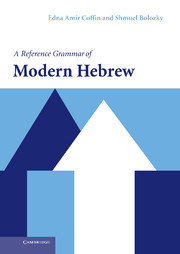Book contents
- Frontmatter
- Contents
- Preface
- Chapter 1 Preliminary discussion
- Chapter 2 Writing and pronunciation
- Chapter 3 The verb system
- Chapter 4 Verb pattern groups
- Chapter 5 The noun system
- Chapter 6 Pronouns
- Chapter 7 Numerals
- Chapter 8 Adjectives
- Chapter 9 Adverbs and adverbial expressions
- Chapter 10 Particles
- Chapter 11 Noun phrases
- Chapter 12 Verb phrases
- Chapter 13 Modal verbs and expressions
- Chapter 14 Clauses and sentences
- Chapter 15 Language in context
- Appendix 1 Verb tables
- Appendix 2 Noun tables
- Appendix 3 Particle tables
- Appendix 4 Punctuation rules
- Appendix 5 Plene writing
- Index of grammatical topics
Chapter 15 - Language in context
Published online by Cambridge University Press: 05 June 2012
- Frontmatter
- Contents
- Preface
- Chapter 1 Preliminary discussion
- Chapter 2 Writing and pronunciation
- Chapter 3 The verb system
- Chapter 4 Verb pattern groups
- Chapter 5 The noun system
- Chapter 6 Pronouns
- Chapter 7 Numerals
- Chapter 8 Adjectives
- Chapter 9 Adverbs and adverbial expressions
- Chapter 10 Particles
- Chapter 11 Noun phrases
- Chapter 12 Verb phrases
- Chapter 13 Modal verbs and expressions
- Chapter 14 Clauses and sentences
- Chapter 15 Language in context
- Appendix 1 Verb tables
- Appendix 2 Noun tables
- Appendix 3 Particle tables
- Appendix 4 Punctuation rules
- Appendix 5 Plene writing
- Index of grammatical topics
Summary
Introduction
Many grammars consider the sentence as the maximal linguistic unit for discussion. Thus sentences are often discussed and described as separate, independent entities (‘context free’), rather than parts of larger units of text. Language in context has to be considered beyond the domain of the individual sentence. It is usually a sequence of sentences (or utterances), which combine into a coherent unit, organized around a particular topic of discussion.
Language in context has its own rules. Ordinary word order and fully and well-constructed sentences give way to different language arrangements, dependent on a host of pragmatic considerations. Language utterances get their meaning not only from their formal structures, but also from the various communicative situations and contexts in which they are used, as well as from cultural conventions unique to each language. Communicative acts are conveyed in a variety of language registers by agreed upon language codes, prescribed by different communities of speakers in an array of communicative and social situations. It is important to view meaning not only through dictionary values and morphological or syntactic structures, but also as integral parts of larger texts and contexts.
The terms ‘text’ and ‘discourse’ are often used interchangeably to refer to language beyond individual sentences. Although ‘text’ is more closely associated in our minds with written materials, and ‘discourse’ with naturally occurring language, emphasizing conversation and social interaction, the distinction is generally no longer drawn today.
- Type
- Chapter
- Information
- A Reference Grammar of Modern Hebrew , pp. 364 - 389Publisher: Cambridge University PressPrint publication year: 2005



